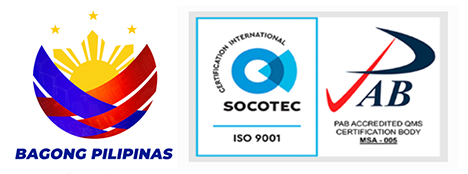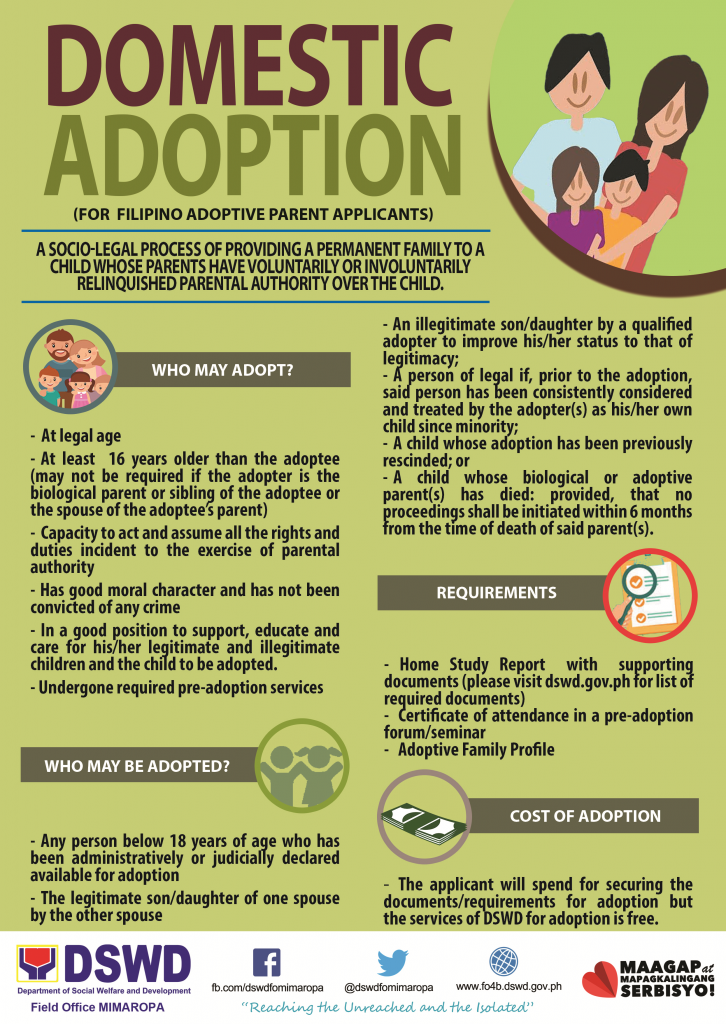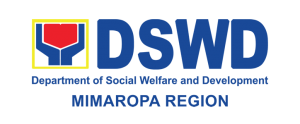DOMESTIC ADOPTION IN THE PHILIPPINES:
Republic Act No. 8552, otherwise known as Domestic Adoption Act of 1998 is an Act Establishing the rules and policies on the Domestic Adoption of Filipino children. Adoption is defined as a socio-legal process of providing a permanent family to a child whose parents have voluntarily or involuntarily relinquished parental authority over the child.
The law declared the policy of the state to “ensure that every child remains under the care and custody of his/her parent(s) and be provided with love, care and understanding and security towards the full and harmonious development of his/her personality. Only when such efforts prove insufficient and no appropriate placement or adoption within the child’s extended family is available shall adoption by an unrelated person shall be considered. However, no direct placement of a child to a non-relative shall be countenanced.” Also, to safeguard the biological parent (s) from making hurried decisions to relinquish his/her parental authority over his/her child, prevent the child from unnecessary separation from his/her biological parent (s) and protect adoptive parent(s) from attempts to disturb his/her parental authority and custody over his/her adopted child.
Adoption is the most complete means whereby permanent family life can be restored to a child deprived of his/her biological family.
There are two (2) types of adoption in the Philippines:
Agency adoption – wherein a licensed adoption agency finds and develops adoptive families for children who are voluntarily or involuntarily committed. The adoptive families go through the process from application to finalization of the child’s adoption under the auspices of the Department of Social Welfare and Development or a licensed Child-Placing Agency like the Kaisahang Buhay Foundation. Through this type of adoption, the legal rights of the child, the parents who gave birth to the child and the parents who will adopt the child, are all equally protected.
Relative adoption – is when the biological parents make a direct placement of the child to a relative within the fourth (4th) degree of consanguinity or affinity with whom they relinquish parental authority over their child.
EFFECTS OF ADOPTION
- Sever all legal ties between the biological parent(s) and the adoptee, except when the biological parent is the spouse of the adopter;
- Deem the adoptee as a legitimate child of the adopter;
- Give adopter and adoptee reciprocal rights and obligations arising from the relationship of parent and child, including but not limited to;
- the right of the adopter to choose the name the child is to be known; and
- the right of the adopter and adoptee to be legal and compulsory heirs of each other.
BENEFITS OF ADOPTION
- The adoptive parents shall, with respect to the adopted child, enjoy all the benefits to which biological parents are entitled.
- Maternity and paternity benefits and other benefits given to biological parents upon the birth of a child shall be enjoyed if the adoptee is below seven (7) years of age as of the date the child is placed with the adoptive parents thru the Pre-Adoption Placement Authority issued by the Department of Social Welfare and Development.
QUALIFICATIONS OF PROSPECTIVE ADOPTIVE PARENTS
Any Filipino citizen;
- of legal age,
- at least 16 years older than the adoptee (may not be required if the adopter is the biological parents or sibling of the adoptee or the spouse of the adoptee’s family.
- has full capacity to act and assume all the rights and duties incident to the exercise of parental authority
- of good moral character, has not been convicted of any crime involving moral turpitude
- emotionally and psychologically capable of caring for children
- who is in a good position to support, educate and care for his/her children in keeping with the means of the family.
- has undergone required pre-adoption services
A foreign nationality;
- possessing the same qualifications as above stated for Filipino nationals:
- Provided, that his/her country has diplomatic relations with the Philippines,
- that he/she has been living in the Philippines for at least three (3) years prior to the filing of application for adoption and maintains such residence until adoption decree is entered,
- that he/she has been certified by his/her diplomatic or consular office or any appropriate government agency that he/she has the legal capacity to adopt in his/her country, and that his/her government allows the adoptee to enter his/her country as his/her adopted son/ daughter.
REQUIREMENTS OF PROSPECTIVE ADOPTIVE PARENTS:
For Filipino Applicants:
- Home Study Report with the following supporting documents:
– Authenticated Birth Certificate.
– Marriage Certificate in SECPA form, if married or authenticated Divorce papers with
copy of court decision and Certificate of Finality (for cases of foreign PAPs) by their
Consulate Annulment Decree with Certificate of finality, Declaration of Nullity, or Legal
Separation Documents (for Filipino applicants).
– Written Consent to the Adoption by the legitimate and adopted sons/daughters/if living
with the applicant, who are above 10 years old.
– Physical and Medical Evaluation by a duly licensed physician (Certification to indicate
that applicant has no medical condition that prevent him/her in acting or assuming
parental responsibilities.
– Psychological Evaluation Report (when appropriate). The validity of the report will
depend on the assessment of the Psychologist.
– NBI or Police Clearance.
– Latest income tax or any other documents showing financial capability
– Three (3) Character References
– 3×5 inch sized photos of the applicants and his/her immediate family members
– Affidavit of Temporary Custody by a person or couple who will take care of the child
in untimely death or incapacity to perform parental duties of the adopter.
- Certificate of attendance to pre-adoption forum/seminar.
Additional Requirements for Foreign Applicant
– Certification that the applicant(s) have legal capacity to adopt in his/her country
– Certificate of Residence in the Philippines issued by the Bureau of Immigration or
Department of Foreign Affairs.
– Two (2) character references from non-relatives who knew the applicant(s) in the country
of which he/she is a citizen or was a resident prior to residing in the Philippines, except for
those who have resided in the Philippines for more than fifteen (15) years
– Police Clearance from all places of residence in the past two (2) years, immediately prior
to residing in the Philippines.
WHO MAY BE ADOPTED?
- Any person below 18 years of age who has been issued a Certification Declaring a Child as Legally Available for Adoption (CDCLAA);
- The legitimate son/daughter of one spouse by the other spouse;
- An illegitimate son/daughter by a qualified adopter to improve his/her status to that of legitimacy;
- A person of legal age if, prior to the adoption, said person has been consistently considered and treated by the adopter as his/ her own child since minority;
- A child whose adoption has been previously rescinded;
- A child whose biological or adoptive parent/s has died. Provided, that no proceeding shall be initiated within six (6) months from the time of death of said parent/s;
PROCESS / PROCEDURE OF DOMESTIC ADOPTION
- Administrative Phase
- Attendance to adoption forum/seminar conducted in DSWD Field Offices or SWADT Offices.
- Application to DSWD-Field Office / SWADT Offices / Licensed Child Placing Agencies / Local Social Welfare and Development Offices.
- Assessment of the Prospective Adoptive Parent (PAPs) Applicant / preparation of Home Study Report.
- Approval of the Regional Director.
- Matching of Prospective Adoptive Parents (PAPs) to child legally available for adoption.
- Issuance of Pre-Adoption Placement Authority (PAPA) and Consent to Adoption.
- Placement of Child with the PAPs
- Supervision of Placement of the child and the PAPS / Monitoring of preparation of
Petition for Adoption for filing to court.
- Judicial Phase
- Filing of Petition for Adoption
- Hearing of the petition in court
- Issuance of Decree of Adoption and Entry of Judgment
- Amendment of Child’s Certificate of Live Birth
POST ADOPTION SERVICES
- Post Adoption Counseling
- Search
- Meeting and reunion
- Intermediary Services
- Adoption Support group
![]()



